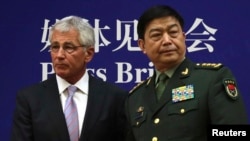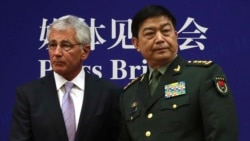"Today, China’s status as a major power is already solidified, built on its growing economic ties across the globe and particularly across the Asia-Pacific region.” U.S. Secretary of Defense Chuck Hagel said recently when he addressed military officers of the Chinese Peoples’ Liberation Army and students at China’s National Defense University in Beijing.
To preserve the stable security environment that has enabled this historic economic development, the United States believes in maintaining a rules-based order built on freedom of navigation and overflight; liberal trade and economic policies that foster widely shared prosperity for all people; halting the proliferation of dangerous and destabilizing weapons of mass destruction; deterring aggression; and clear, consistent and peaceful methods of resolving disputes consistent with international law.
Mr. Hagel added that both the United States and China have a responsibility to address new and enduring regional security challenges.
“As a nation’s power and prosperity grows, so does its responsibilities,” Mr. Hagel said. “And whether the 21st century is one marked by progress, security and prosperity will depend greatly on how China and other leading Asia-Pacific powers meet their responsibilities to uphold a rules-based order.”
“We must work together and in partnership with all the nations of the region, and develop and build on . . . a new model of relations,” Secretary Hagel emphasized. “Developing a new model of military-to-military relations will require a shared understanding of the regional security order we seek and the responsibilities we have to uphold it.”
The new model of military-to-military relations should proceed on three tracks, Secretary Hagel said: First, maintaining sustained and substantive dialogue; second, forging concrete, practical cooperation where the two countries’ interests converge; and third, working to manage competition and differences through openness and communication.
“America’s rebalancing to the Asia-Pacific is about ensuring that America’s presence and engagement, including our relationship with China, keeps pace with the Asia-Pacific’s rapidly evolving economic, diplomatic and security environment,” Secretary Hagel said. “It will require bold leadership that seeks to deepen practical cooperation in areas of shared interest, while constructively managing differences through open dialogue and candor.”
To preserve the stable security environment that has enabled this historic economic development, the United States believes in maintaining a rules-based order built on freedom of navigation and overflight; liberal trade and economic policies that foster widely shared prosperity for all people; halting the proliferation of dangerous and destabilizing weapons of mass destruction; deterring aggression; and clear, consistent and peaceful methods of resolving disputes consistent with international law.
Mr. Hagel added that both the United States and China have a responsibility to address new and enduring regional security challenges.
“As a nation’s power and prosperity grows, so does its responsibilities,” Mr. Hagel said. “And whether the 21st century is one marked by progress, security and prosperity will depend greatly on how China and other leading Asia-Pacific powers meet their responsibilities to uphold a rules-based order.”
“We must work together and in partnership with all the nations of the region, and develop and build on . . . a new model of relations,” Secretary Hagel emphasized. “Developing a new model of military-to-military relations will require a shared understanding of the regional security order we seek and the responsibilities we have to uphold it.”
The new model of military-to-military relations should proceed on three tracks, Secretary Hagel said: First, maintaining sustained and substantive dialogue; second, forging concrete, practical cooperation where the two countries’ interests converge; and third, working to manage competition and differences through openness and communication.
“America’s rebalancing to the Asia-Pacific is about ensuring that America’s presence and engagement, including our relationship with China, keeps pace with the Asia-Pacific’s rapidly evolving economic, diplomatic and security environment,” Secretary Hagel said. “It will require bold leadership that seeks to deepen practical cooperation in areas of shared interest, while constructively managing differences through open dialogue and candor.”






